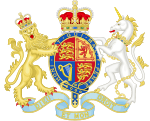- Chancellor of the High Court
-
This article is part of the series: Courts of England and Wales Law of England and Wales  Administration
Administration- Ministry of Justice
- Her Majesty's Courts and Tribunals Service
- Judges' Council
Civil courtsCriminal courtsCriminal prosecutionLegal professionThe Chancellor of the High Court is the head of the Chancery Division of the High Court of Justice of England and Wales. Before October 2005, when certain provisions of the Constitutional Reform Act 2005 took effect, the office was known as the Vice-Chancellor. He nominally acted as the Lord Chancellor's deputy in the English and Welsh legal system; however, he was in effect the head of the Chancery Division. Despite the change of title, the duties of the office did not change.
Contents
History of the office
The judges of the Court of Chancery (apart from the Lord Chancellor and the Master of the Rolls), before the creation of the High Court of Justice of England and Wales in 1873-75, held the title of Vice-Chancellor. The first of them was appointed in 1813 and two more such posts were added in 1842. After the Judicature Acts of the 1870s Vice-Chancellors were not appointed, and judges of the Chancery Division were styled "Mr. Justice ..." like other judges of the High Court (this style had previously been used for judges of the common law courts).
A similar position was held by Hedges Eyre Chatterton as Vice-Chancellor of Ireland from 1867 to 1904 in the High Court of Justice (Ireland) Chancery Division, as deputy to the Lord Chancellor of Ireland.
In 1971 the office of Vice-Chancellor was recreated, to be the Vice President of the Chancery Division of the High Court.
Sir Robert Andrew Morritt became the Vice-Chancellor in July 2000 and is the first Chancellor of the High Court.
Ireland
A similar position existed in Ireland
Vice-Chancellors of England, 1813-1850
- 10 April 1813: Sir Thomas Plumer
- 6 January 1818: John Leach
- 2 May 1827: Sir Anthony Hart
- 1 November 1827: Sir Lancelot Shadwell
Vice-Chancellors, 1841-1886
- 1841-1851: Sir James Lewis Knight-Bruce
- 1841-1850: James Wigram
- 1850-1851: The Lord Cranworth
- 1851-1853: Sir George James Turner
- 1851-1866: Sir Richard Torin Kindersley
- 1851-1852: Sir James Parker
- 1852-1871: Sir John Stuart
- 1853-1868: Sir William Page Wood
- 1866-1881: Sir Richard Malins
- 1868-1869: Sir George Markham Giffard
- 1869-1870: Sir William Milbourne James
- 1870-1886: Sir James Bacon
- 1871-1873: Sir John Wickens
- 1873-1882: Sir Charles Hall
Vice-Chancellors, 1971-2005
- 1971: Sir John Pennycuick (1899-1982)
- 1974: Sir (John) Anthony Plowman[1] (1905-1993)
- 1976: Sir Robert Edgar Megarry (1910-2006)
- 1985: Sir Nicholas Browne-Wilkinson (b. 1936)
- 1991: Sir Donald Nicholls (b. 1933)
- 1994: Sir Richard Scott (b. 1934)
- 2000: Sir Andrew Morritt (b. 1938)
Chancellor of the High Court, 2005-present
- 2005: Sir Andrew Morritt
References
- ^ Who's Who 1986
- A History of English Law, Vol. I, by Sir William Holdsworth (Methuen & Co, 1961 reprint)
- Twentieth-Century British Political Facts 1900-2000, by David Butler and Gareth Butler (Macmillan Press 2000)
- Joseph Haydn, The Book of Dignities, 1894
External links
- New legal year sees new team take up posts Department for Constitutional Affairs press release, 3 October 2005)
- Lists of Judges from the Department for Constitutional Affairs
Categories:- Chancellors (government)
- High Court of Justice
- United Kingdom law stubs
Wikimedia Foundation. 2010.
